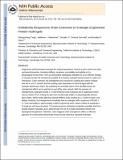Oxidatively Responsive Chain Extension to Entangle Engineered Protein Hydrogels
Author(s)
Tang, Shengchang; Glassman, Matthew J.; Li, Shuaili; Socrate, Simona; Olsen, Bradley D
DownloadOlsen_Oxidatively Responsive.pdf (829.6Kb)
PUBLISHER_POLICY
Publisher Policy
Article is made available in accordance with the publisher's policy and may be subject to US copyright law. Please refer to the publisher's site for terms of use.
Terms of use
Metadata
Show full item recordAbstract
Engineering artificial protein hydrogels for medical applications requires precise control over their mechanical properties, including stiffness, toughness, extensibility, and stability in the physiological environment. Here we demonstrate topological entanglement as an effective strategy to robustly increase the mechanical tunability of a transient hydrogel network based on coiled-coil interactions. Chain extension and entanglement are achieved by coupling the cysteine residues near the N- and C-termini, and the resulting chain distribution is found to agree with the Jacobson–Stockmayer theory. By exploiting the reversible nature of the disulfide bonds, the entanglement effect can be switched on and off by redox stimuli. With the presence of entanglements, hydrogels exhibit a 7.2-fold enhanced creep resistance and a suppressed erosion rate by a factor of 5.8, making the gels more mechanically stable in a physiologically relevant open system. While hardly affecting material stiffness (only resulting in a 1.5-fold increase in the plateau modulus), the entanglements remarkably lead to hydrogels with a toughness of 65 000 J m[superscript –3] and extensibility to approximately 3000% engineering strain, which enables the preparation of tough yet soft tissue simulants. This improvement in mechanical properties resembles that from double-network hydrogels but is achieved with the use of a single associating network and topological entanglement. Therefore, redox-triggered chain entanglement offers an effective approach for constructing mechanically enhanced and responsive injectable hydrogels.
Date issued
2014-01Department
Massachusetts Institute of Technology. Institute for Soldier Nanotechnologies; Harvard University--MIT Division of Health Sciences and Technology; Massachusetts Institute of Technology. Department of Chemical EngineeringJournal
Macromolecules
Publisher
American Chemical Society (ACS)
Citation
Tang, Shengchang, Matthew J. Glassman, Shuaili Li, Simona Socrate, and Bradley D. Olsen. “Oxidatively Responsive Chain Extension to Entangle Engineered Protein Hydrogels.” Macromolecules 47, no. 2 (January 28, 2014): 791–799.
Version: Author's final manuscript
ISSN
0024-9297
1520-5835